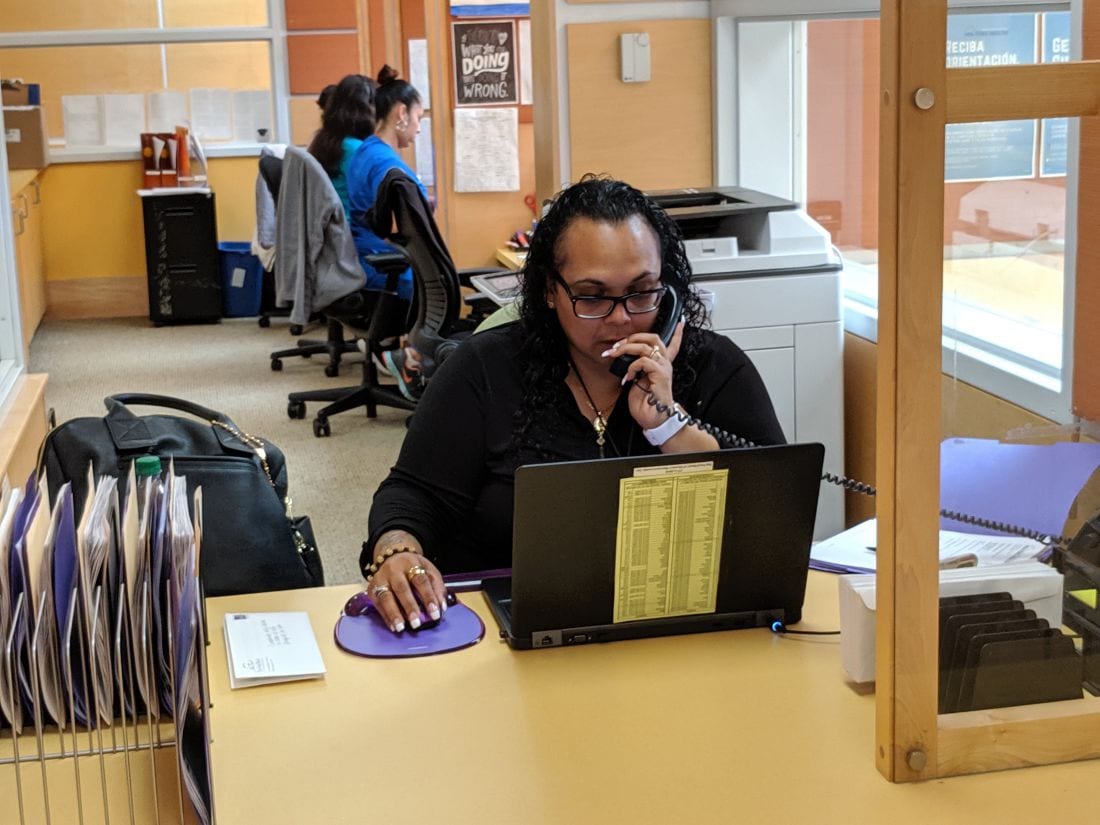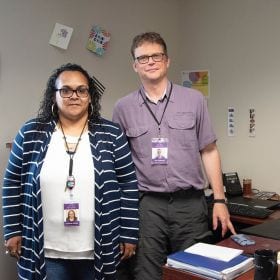July 30, 2019 In Their Words
Food Bank of Western Massachusetts

My role as the Food Assistance Referral Coordinator for The Food Bank of Western Massachusetts is to ensure that patients at Holyoke and Chicopee Health Centers who “screen positive” for food insecurity receive a referral that will connect them with the Food Bank’s emergency food network and other kinds of help such as finding housing, employment opportunities, English classes, fuel assistance, and healthy living programs just to name a few!
My typical day begins with connecting with referral specialists from three departments at the Holyoke Health Center beginning with Pediatrics, followed by Adult Medicine, and finishing with Family Practice. After I receive each referral, I add them to the Oasis Insight, which is a software program we use to create cases and connect patients to other partner organizations for services they might need other than emergency food access.
At both centers, every patient is asked the following two questions:
- In the last 12 months have you worried whether food would run out before you had money to buy more?
- Did the food that you bought actually run out and you didn’t have money to buy more?
Every patient who answers “true” or “sometimes true” to either of the questions is immediately offered a referral to The Food Bank of Western Massachusetts to be connected to our emergency food network. The emergency food network consists of food pantries, meal programs, mobile food banks and food for the elderly programs, all of which are a starting point to establishing food security for these patients. Once a person is connected to the network, they can begin to receive food on a regular basis. Pantries provide a combination of fresh and shelf stable items and can be accessed at least on a monthly basis. The four Mobile locations in Holyoke and Chicopee make it possible for one to receive fresh vegetables on a weekly basis!
After I create a case, I call each patient via telephone to offer services. When I initially make contact, I introduce myself and verify their information to make sure I’m speaking with the right person. I tell them why I’m calling, and then let them know what services we can offer. As a Holyoke native and Spanish speaker, I am able to build trust and make a connection with our Spanish speaking patients. I ask questions about their home life and the people living there, if they receive SNAP benefits, and then offer to mail them a list of all food pantries, meal programs and mobile food banks in their area. By gaining trust and making the patients comfortable, I am able to ask other questions such as:
- Does anyone need help looking for work?
- Would anyone benefit from taking an English class?
- Are there any small children in the home who have a working parent/guardian that needs help with child care?
- Do they know how to apply for fuel assistance and/or utility assistance in their area?
- Are they at risk of homelessness?
- Does anyone in the home have diabetes?
- Are there any smokers who need help to quit smoking?
- Are they interested in nutrition services?
I end the call on a positive note with an open invitation to the patient and their family for a fun and free community dinner held twice a month in Holyoke.

After each conversation has ended, I submit the referral to each organization outside of the Food Bank of Western Massachusetts. Our partner organizations receive the referral via email notification, and they are then responsible for contacting the patient or family to offer services and/or update the status of each referral based on the conversation they have with the patient or family. Sometimes I experience bumps in the road when trying to contact patients such as inaccurate phone numbers, patients not returning calls, and patients who turn down the referrals even after screening positive for food insecurity, but overall we have been successful in helping 2,910 people and families affected by this program.
Although the job has some pressing barriers, the work is so rewarding because I can personally see how these referrals can create positive and lasting change in people’s lives. I specifically recall a referral involving a young woman who was homeless at the time. She was staying anywhere she could find shelter, from sleeping at friend’s houses, with family, park benches and even in a car. I immediately connected her with our emergency food network, Wayfinders, for homelessness prevention and a housing assessment, and MassHire for resume building. Through these services, she was assisted in finding shelter placement and hired by a local barber shop thanks to the help on building a resume. This is what I call a true success story of the work that I do—helping members of the community, many of whom had no idea on how to access much needed assistance, or even know about these services. Since I began working here, I have received 1,431 patients who screened positive for food insecurity from both centers. 936 of them were referred for food services and beyond, and due to multiple referrals for a patient, there have been a total of 2,383 referrals made. The outcomes of a successful referral have a significant impact on all parties in the work and makes me proud to be a part of such an incredible program.
About the Author: Damaris Arroyo has worked in social service many years prior to her time at the Food Bank. She previously worked as a family partner with the Behavioral Health Network and was employeed by the Center for Human Development as a secure residential treatment counselor working with incarcerated youth aged 14 to 21. She enjoys using her skills to help others in need.
The Food Bank is a CFWM Innovation Grant Awardee, which encourages nonprofits to develop and execute novel ideas. The Food Bank of Western Massachusetts is a hunger-relief non-profit organization serving 250,000 individuals at risk of, or facing, hunger in Berkshire, Franklin, Hampden and Hampshire counties. Their mission is to feed, lead, and strengthen our communities to end hunger. They distribute over 10 million pounds of food from state government, federal government, local farms, our Food Bank farm, retail and wholesale businesses, community organizations and individual donations to our member agencies in Western Massachusetts. In 2017, we piloted a Food Insecurity Screening Referral Initiative in Holyoke in collaboration with the pediatrics department at Holyoke Health Center and other partners through the Coalition To End Hunger. In 2018, we have expanded that initiative to include all patients at the center and look towards bringing this collaborative model to other parts of Western Massachusetts in the years to come.